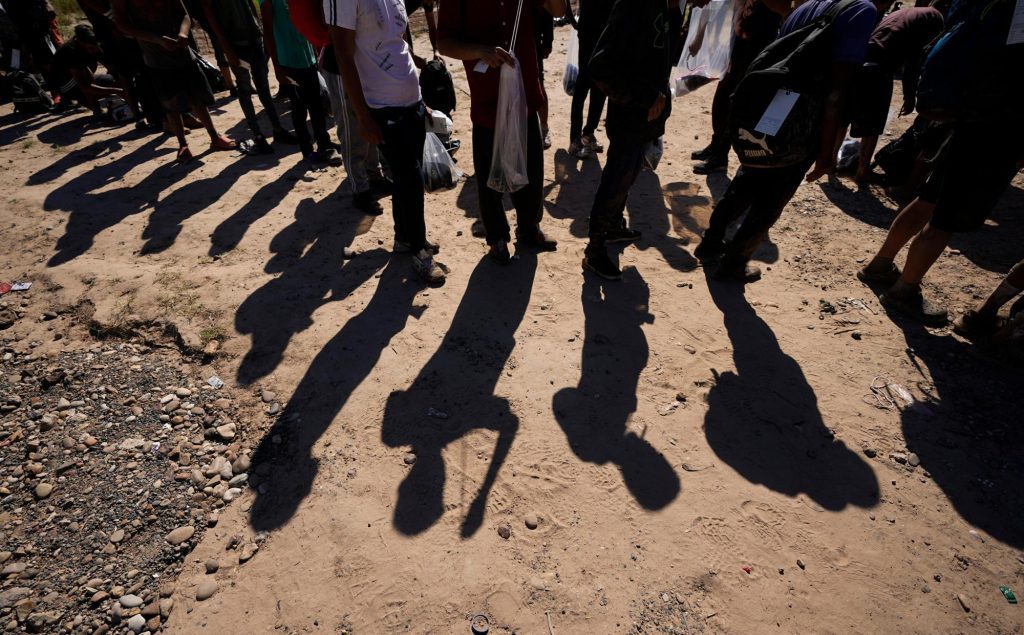NEW ORLEANS (AP) — A Texas regulation letting the state detain and expel migrants thought to have unlawfully entered the U.S. will stay on pause for now, a federal appeals court ruled.
The 2-1 decision late Tuesday from a three-judge panel of the 5th U.S. Circuit Court of Appeals will probably halt implementation of the rule until a final ruling on its legitimacy, either by the 5th Circuit or the U.S. Supreme Court.
The decision followed a March 20 hearing by a three-judge panel of the court. It’s simply the most recent development in a back-and-forth legal case over Republican Gov. Greg Abbott’s strict new immigration law that has not yet concluded.
The Justice Department has argued that Texas’ law clearly violates federal authority and would create disorder at the border. Texas has argued that President Joe Biden’s administration isn’t doing enough to manage the border and that the state has the right to take action.
Chief Judge Priscilla Richman, an appointee of Republican President George W. Bush, referred to a 2010 Arizona law that was largely invalidated by the U.S. Supreme Court to say immigration enforcement is solely a federal responsibility.
“For almost 150 years, the Supreme Court has stated that the power to control immigration — the entry, admission, and removal of noncitizens — belongs exclusively to the federal government,” wrote Richman, an appointee of Republican President George W. Bush.
The Texas regulation, Richman wrote, “creates separate, distinct state criminal offenses and related procedures regarding unauthorized entry of noncitizens into Texas from outside the country and their removal.”
She was supported in her opinion by Judge Irma Carrillo Ramirez, a Biden appointee.
Judge Andrew Oldham, an appointee of former President Donald Trump and a previous aide to Abbott, disagreed with the majority decision.
Oldham stated that the Biden administration faced a major obstacle to assume the sovereign power that Texas has to enforce a law its people and leaders desire. The judge anticipated the same 2-1 division when the case's legitimacy is deliberated during the legal challenge.
“There is actual danger in this approach. In our federal system, the State of Texas is supposed to keep at least some of its sovereignty,” Oldham wrote. “Its people are meant to be able to utilize that sovereignty to elect representatives and send them to Austin to discuss and enact laws that address the urgent needs experienced and desired by Texans.”
The law was enforceable for a few hours on March 19 after the U.S. Supreme Court cleared the way. However, the high court did not rule on the legitimacy of the case. It instead sent the case back to the 5th Circuit, which then suspended implementation while considering the latest appeal.
The recent ruling maintains the suspension in place.
Spokespersons for Abbott and state Attorney General Ken Paxton did not immediately return phone calls for comment Wednesday morning.
The regulation endorsed by Abbott allows any Texas law enforcer to detain individuals suspected of illegally entering the country, but the brief period while the law was enforceable revealed that many sheriffs were unprepared, unable, or uninterested in enforcing SB4 in the first place.
Sheriff Thaddeus Cleveland of Terrell County, which borders for more than 50 miles (80 kilometers), said during a gathering of about 100 sheriffs at the state Capitol last week that there's no practical way for him to enforce the law.
Cleveland stated that he has no means to transport people, the county jail can only accommodate seven individuals, and the nearest port of entry is over 2 1/2 hours away.
Smith County Sheriff Larry Smith, who serves as the president of the Texas Sheriff’s Association, mentioned that the law will have minimal impact in his area in East Texas, which is closer to Louisiana and Oklahoma than the nearly 400 miles (644 kilometers) distant Mexico.
Upon being detained, migrants could opt to follow a Texas judge’s directive to leave the U.S. or could face charges for illegal entry as a misdemeanor. Those who do not leave may be re-arrested under more serious felony charges.
During the brief period when the law was in force, Texas did not announce any arrests. Authorities have provided various explanations on how they might implement the law. Mexico has stated that it would not accept anyone ordered by Texas to cross the border.
The law is seen by opponents as the most significant attempt by a state to regulate immigration since an Arizona law over a decade ago that was partially invalidated by the Supreme Court. Critics have also warned that the Texas law could result in civil rights abuses and racial profiling.
Supporters have dismissed those concerns, stating that arresting officers must have credible reasons, which could involve witnessing the illegal entry or observing it on video. They also anticipate that the law would primarily be used in border counties, although it would be applicable statewide.









